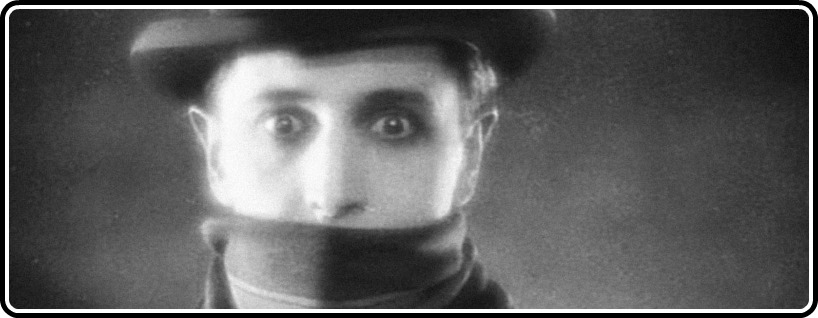August 13 has become something of a holiday for cinephiles. Marking the birth of one of the greatest filmmakers ever to walk the face of this earth, Alfred Hithcock, it has become a day where we truly remember one of the greatest, and most influential filmographies in the history of cinema. As his masterwork, Vertigo, takes its place as ‘the greatest film ever made,’ and people continue to debate if it is not only that significant, but if that film is even the best of Hitchcock’s canon, it’s also a great day and a great week to delve into some of his lesser known work, and particularly a masterpiece from his silent collection.
The Lodger is your basic Hitchcock thriller story. A proto-Jack The Ripper murderer is running the streets in London, only to find an innocent man accused of the heinous crimes. Featuring a cavalcade of touches, be it visually or intellectually, that would run rampant throughout Hitchcock’s lengthy filmography. Based on a novel from writer Marie Belloc Lowndes and a play co-written by Lowndes, the film itself may very well be, qualitatively, minor within Hitchcock’s canon, however, it is without a doubt one of the director’s most important and influential films from an era that has largely been either overlooked, or relegated to the Wal-Mart $5 DVD bin thanks to less than stellar collections of his public domain features.
And if there is a film that deserves more than that, this is it.
[youtube http://www.youtube.com/watch?v=dfyhFWoNARk]Visually, the film is as strong as any early Hitchcock film, and is a perfect reference for those looking to see just where this auteur got his feet wet. Featuring brooding lighting, hauntingly plaintive and introspective camera work, and some of the best black and white photography you’ll see, The Lodger is a thrilling feature, that is far ahead of its time. Be it a shot looking down the center of a spiral staircase, or the use of what would become thriller and horror tropes like the slow shaking of a chandelier, The Lodger is a deftly frightening film, particularly due to Hitchcock’s brilliant use of his camera.
It’s also as intellectually Hitchcockian as any of his early films come. Suspenseful, what with its cracker jack (if quite simplistic and anti-ambiguous narrative) story and all, the film thrives on-screen as an inherently psycho-sexual thriller featuring the visual trappings of distinctly surreal film noir works from years earlier. A filmmaker’s filmmaker, you can see the Murnau inspirations within his features (particularly his lighting, which is as much from Hitch’s mind as it is the mind of the man behind a film like Nosferatu), while also being able to take on tropes like one’s strive for innocence, and the existential horrors that come from being unable to have any say in your future. This is a trope, the idea of a person needing to prove his or her innocence, that would be touched on many times throughout his filmography, and here is may very well be done in one of the most intriguing ways found within the canon.
As with any Hitchcock film, the cast is absolutely impeccable. Featuring top-notch performances from the model June, Malcolm Keen and particularly star Ivor Novello as ‘The Lodger’ Jonathan Drew, the trio give fantastic silent film performances, adding a great deal of emotional heft to a film that relies as heavily as any film out there on the ability of those involved to steep the viewer in the thrills and chills that are found within this twisted narrative. And yes, even Hitchcock himself has a cameo near the very beginning of the feature.
Part of the ‘Hitchcock Nine,’ the film has recently been restored by the BFI National Archive, and while it’s still public domain here in the states, Criterion could do wonders with a Blu-ray release of this film. Hitchcock has been a relatively recently beloved director, as the time in which he originally released his work was not very kind to the director. Truly, his rise to insane all-time great status only came when the French filmmakers like Godard and Truffaut began proclaiming him as one of the greatest of all time, and with this odd status shift for Hitchcock comes the fact that his early work is in massively rough shape. However, a Criterion restoration would be one of the most talked about restorations in quite some time, so the buzz is distinctly there.
[youtube http://www.youtube.com/watch?v=R9BJRihv4yc]Toss in some commentary tracks, a secondary score (the most recent composition recorded for this film is penned by Ashley Irwin, who wrote a composition in honor of the director’s 100th birthday) from someone with a penchant for giving us chills (Jonny Greenwood, I’m staring directly at you sir), and a look at the restoration of the film and its relation to Hitch’s canon, and you have a must-own release. Or how about beefing up your Eclipse series? Nothing would get people out in droves to buy your box sets than a collection of early Hitchcock features. Give us restored versions of The Ring, The Manxman, and hell, there is even that 30 minutes of recently rediscovered footage of Hitch’s work on The White Shadow that would be a welcome addition to a Blu-ray of the film. Criterion, you’ve got a gold mine here. Now take our advice and run with it.



